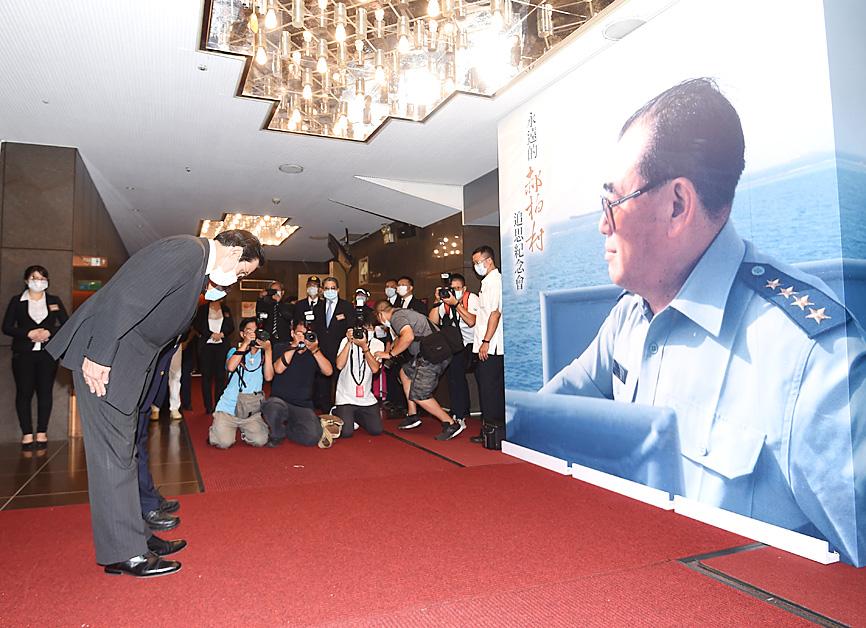Several senior members of the Chinese Nationalist Party (KMT) yesterday attended a memorial service in Taipei for late former premier Hau Pei-tsun (郝柏村), who died on March 30 at the age of 100.
KMT Chairman Johnny Chiang (江啟臣), who serves as KMT chairman, former New Taipei City mayor Eric Chu (朱立倫), former Kaohsiung mayor Han Kuo-yu (韓國瑜) and former president Ma Ying-jeou (馬英九) were among those who attended the service.
Han and Chu declined media requests for comment, while Chiang, in response to media questions, reiterated the KMT’s support for local disease prevention efforts.

Photo: Fang Pin-chao, Taipei Times
Ma took the opportunity to respond to comments by President Tsai Ing-wen (蔡英文).
Tsai on Saturday said on Facebook that a person entrusted by the people to lead the nation should not think that “bowing down” on the issue of national sovereignty, or staying quiet about democratic values, can bring about peace, referring to Ma earlier that day criticizing her refusal to acknowledge the so-called “1992 consensus.”
The “1992 consensus,” a term former Mainland Affairs Council chairman Su Chi (蘇起) admitted making up in 2000, refers to a tacit understanding between the KMT and the Chinese Communist Party that both sides of the Taiwan Strait acknowledge there is “one China,” with each side having its own interpretation of what “China” means.
Ma yesterday said that when he was president, from 2008 to 2016, Taiwan and China signed 23 agreements, each of which was “equal” and “reciprocal.”
When he and Chinese President Xi Jinping (習近平) met in Singapore in 2015, the two were also on an equal footing, Ma said.
In his eight years in power, he never “kneeled,” while Tsai has done it “many times,” he said, listing as examples the Tsai administration’s handling of the Itu Aba Island (Taiping Island, 太平島), Japan’s expulsion of Taiwanese fishers near Okinotori Island and the Economic Cooperation Framework Agreement.
Meanwhile, former Taipei mayor Hau Lung-bin (郝龍斌), one of Hau Pei-tsun’s two sons, said his father had hoped not to disturb his colleagues and friends, and to allow everyone to remember him in their own way.
Many elders wanted to pay their respects to Hau Pei-tsun, hence the memorial yesterday, he added.
Additional reporting by Sherry Hsiao

POSITIVE DEVELOPMENT: Japan and the US are expected to hold in-depth discussions on Taiwan-related issues during the meeting next month, Japanese sources said The holding of a Japan-US leaders’ meeting ahead of US President Donald Trump’s visit to China is positive news for Taiwan, former Japan-Taiwan Exchange Association representative Hiroyasu Izumi said yesterday. After the Liberal Democratic Party’s landslide victory in Japan’s House of Representatives election, Japanese Prime Minister Sanae Takaichi is scheduled to visit the US next month, where she is to meet with Trump ahead of the US president’s planned visit to China from March 31 to April 2 for a meeting with Chinese President Xi Jinping (習近平). Japan and the US are expected to hold in-depth discussions on Taiwan-related issues during the

‘LIKE-MINDED PARTNER’: Tako van Popta said it would be inappropriate to delay signing the deal with Taiwan because of China, adding he would promote the issue Canadian senators have stressed Taiwan’s importance for international trade and expressed enthusiasm for ensuring the Taiwan-Canada trade cooperation framework agreement is implemented this year. Representative to Canada Harry Tseng (曾厚仁) in an interview with the Central News Agency (CNA) said he was increasingly uneasy about Ottawa’s delays in signing the agreement, especially as Ottawa has warmed toward Beijing. There are “no negotiations left. Not only [is it] initialed, we have three versions of the text ready: English, French and Mandarin,” Tseng said. “That tells you how close we are to the final signature.” Tseng said that he hoped Canadian Prime Minister Mark Carney

Taiwan has received more than US$70 million in royalties as of the end of last year from developing the F-16V jet as countries worldwide purchase or upgrade to this popular model, government and military officials said on Saturday. Taiwan funded the development of the F-16V jet and ended up the sole investor as other countries withdrew from the program. Now the F-16V is increasingly popular and countries must pay Taiwan a percentage in royalties when they purchase new F-16V aircraft or upgrade older F-16 models. The next five years are expected to be the peak for these royalties, with Taiwan potentially earning

President William Lai (賴清德) yesterday bestowed one of Taiwan’s highest honors on Saint Vincent and the Grenadines (SVG) Ambassador Andrea Clare Bowman in recognition of her contributions to bilateral ties. “By conferring the Order of Brilliant Star with Grand Cordon on Ambassador Bowman today, I want to sincerely thank her, on behalf of the Taiwanese people, for her outstanding contribution to deepening diplomatic ties between Taiwan and SVG,” Lai said at a ceremony held at the Presidential Office in Taipei. He noted that Bowman became SVG’s first ambassador to Taiwan in 2019 and